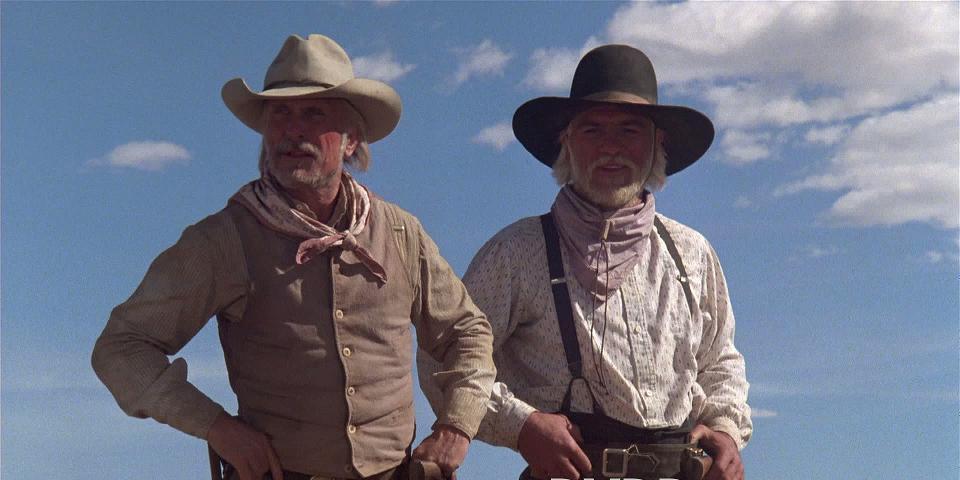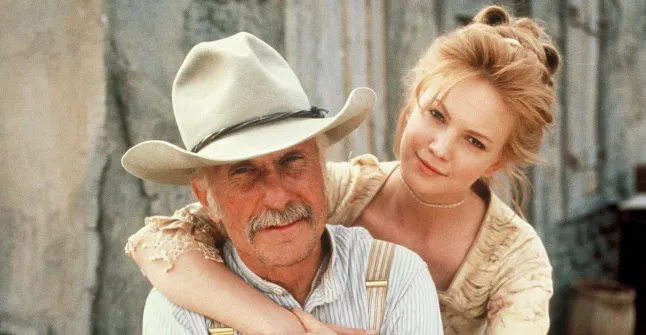Released in 1989, “Lonesome Dove” felt in many ways ahead of its time. It was a spectacle, recreating the Old West in ways only film had really managed. Based on a novel by Larry McMurtry, the miniseries cast Robert Duvall and Tommy Lee Jones as two Texas Rangers turned ranchers on a cattle drive north.
The two lead an accompaniment of various characters each hoping to accomplish their dreams. But the group soon learns that the frontier is fraught with danger and perils. The miniseries was acclaimed for its vision of the West and its commentary on the character’s lives and fates.
But the journey to screen wasn’t easy. Here are five facts you may not know about the “Lonesome Dove.”
1. John Wayne Almost Starred in the ‘Lonesome Dove’

It’s hard to imagine anyone other than Robert Duvall and Tommy Lee Jones as Gus and Call. But the Duke himself almost starred in “Lonesome Dove” back in the 1970s. Of course, then, it was a screenplay called “Streets of Laredo.”
Before turning it into a novel, McMurtry envisioned the story as a movie. John Wayne was set to play the role of Call opposite of Jimmy Stewart as Gus. The film also recruited Henry Fonda, with Peter Bogdanovich.
But Wayne backed out of the film after director and friend John Ford urged the actor to reconsider. Ford didn’t like the script. This derailed the movie, and the story of the Lonesome Dove wouldn’t see the light of day until it became a novel.
2. Robert Duvall and Tommy Lee Jones Swapped Roles
At the end of the day, Tommy Lee Jones was probably just happy to be in the production. Originally, producers coveted both Charles Bronson and James Garner for the miniseries. But Bronson declined and Garner dropped out due to health reasons. Additionally, Duvall was originally set to play the stern and by the book Cal. But on his wife’s advice, Duvall asked to switch roles, lending his signature warmth to the carefree spirit of Gus.
It’s hard to imagine Jones and Duvall in each other’s roles. But that was almost a reality. For his part, Jones brought an air of authenticity. The actor actually owns a ranch in Texas and performed all of his own riding in the series.
3. Production Used Real Animals to Recreate the West
Production for the miniseries was massive and lasted 16 weeks. The cast filmed six days a week at a time to bring the western to life. Additionally, in the miniseries, there were 89 speaking roles, 1,000 extras, 90 crew members, and 30 wranglers. The wranglers were responsible for the 100 horses and 1,400 cattle.
Real animals gave production authenticity, but they also almost injured Duvall. In one scene, bullets scared the horse that Duvall was one. The animal bucked the actor to the ground. To preserve the shot, cameras kept rolling, and Duvall’s near accident can be seen in the final production.
Fortunately, this never happened on set. Butt the phenomenon called “St. Elmo’s Fire,” featured in the miniseries and book, is based in reality. It’s what happens when a cow gets struck by lightning. The electricity passes through the animals to the rest of the herd.
4. Costumes from the ‘Lonesome Dove’ Are on Display

Texas sure loves them some “Lonesome Dove,” celebrating the miniseries. In San Marcos, Texas State University houses props, costumes, and other memorabilia. The exhibit, part of the Wittliff Collection, is open to the public for any fans to visit and see the original productions. Screenwriter Bill Wittliff is responsible for the collection. He convinced his fellow cast and crew to donate props and artifacts from the show to the university for display.
5. Rights to the Miniseries Were Bought Before the Novel Was Published
John Wayne may have passed on the script. But Suzanne De Passe knew a good thing when she saw it. De Passe purchased the film rights to McMurty’s novel in 1985 when it was still unpublished for $50,000. De Passe wanted to create a miniseries to coincide with the book’s launch.
But the idea was poison to every network De Passe pitched it to. Fortunately for her, McMurtry’s novel released to mass acclaim and also secured a Pulitzer Prize. This renewed interest in an adaptation and De Passe suddenly had all the same networks bidding to acquire the miniseries.
Ultimately, “Lonesome Dove” fans are fortunate that the miniseries happened at all, much less to the amount of acclaim it did. As Gus once put it in the novel and miniseries, “If you want any one thing too badly, it’s likely to turn out to be a disappointment. The only healthy way to live life is to learn to like all the little everyday things, like a sip of good whiskey in the evening, a soft bed, a glass of buttermilk, or a feisty gentleman like myself.”
